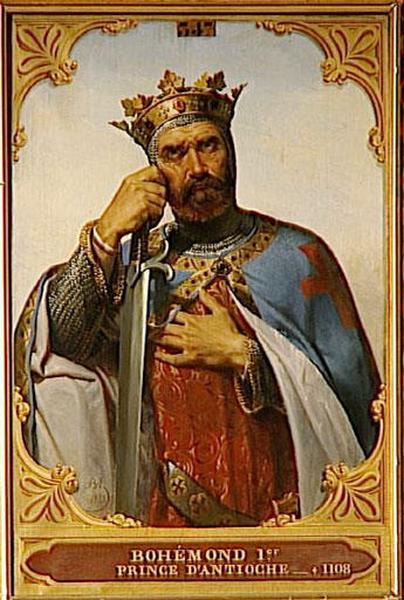1111
Death of a crusading prince
Bohemond of Taranto, prince of Antioch (1058-1111) was one of the leaders of the First Crusade and the founder of the principality of Antioch. Bohemond’s father was the notorious Robert Guiscard, a penniless Norman adventurer, who became first a bandit in southern Italy and then fought his way to a dukedom as a sworn vassal of the papacy. Normans in the 11th century had swarmed out of their French duchy and carved out kingdoms and fiefdoms in England and the Mediterranean where they battled both Muslim armies and the Byzantine Empire. It was the dream of Guiscard that he would conquer the Eastern Roman Empire and that one day Bohemond would sit on the imperial throne in Constantinople. Initially successful in their forays into the territories of the Byzantines, the Norman forces were eventually driven out of the Balkans.
When his father died in 1085, Bohemond fought his half-brother Roger and his fierce step-mother Sichelgaita for succession to Guiscard’s duchy. He was forced to settle for a portion in southern Italy, causing him to look for more territory to conquer. When the First Crusade was preached in 1095 by Pope Urban, who urged the kings of western Europe to recapture the Holy Land, Bohemond saw his opportunity. He raised an army and led it across the Balkans to Constantinople and a rendezvous with the other crusading western nobles and their forces.
The Byzantine Emperor Alexius Comnenus was dismayed by the presence of a massive western force outside the walls. When he appealed to the pope for help against Seljuk Turks he was hoping for bands of mercenary cavalry, not the presence of warriors led by his very recent enemy Bohemond. Alexius met the crusaders and agreed to help and supply them in the journey across Asia Minor as long as they agreed to return imperial lands now under Muslim control to him. The emperor’s daughter Anna Comnena wrote a biography of her father in which she drew a very vivid portrait of Bohemond, whom she had met and of whom she said, he
was such as, to put it briefly, had never before been seen in the land of the Romans, be he either of the barbarians or of the Greeks (for he was a marvel for the eyes to behold, and his reputation was terrifying). Let me describe the barbarian’s appearance more particularly — he was so tall in stature that he overtopped the tallest by nearly one cubit, narrow in the waist and loins, with broad shoulders and a deep chest and powerful arms. And in the whole build of the body he was neither too slender nor overweighted with flesh, but perfectly proportioned … His skin all over his body was very white, and in his face the white was tempered with red. His hair was yellowish, but did not hang down to his waist like that of the other barbarians; for the man was not inordinately vain of his hair, but had it cut short to the ears. Whether his beard was reddish, or any other colour I cannot say, for the razor had passed over it very closely and left a surface smoother than chalk… His blue eyes indicated both a high spirit and dignity; and his nose and nostrils breathed in the air freely; his chest corresponded to his nostrils and by his nostrils…the breadth of his chest. For by his nostrils nature had given free passage for the high spirit which bubbled up from his heart. A certain charm hung about this man but was partly marred by a general air of the horrible… He was so made in mind and body that both courage and passion reared their crests within him and both inclined to war.
The First Crusade fought its way across Asia Minor, defeating all the Turkish armies it met, but relations with the Byzantines were not easy. The crusaders accused the Byzantines of keeping them under-supplied, and of treacherous dealings with Muslim forces. (The Byzantines were at peace with a number of Islamic emirates whereas the westerners were less able to make such a fine distinction.) Finally, after a bloody siege at Antioch which fell in 1098, Bohemond decided to keep the city and remain there despite the emperor’s claims and the desire of other crusaders to continue on to Jerusalem. He named a Catholic clergyman as patriarch of Antioch and expelled the Orthodox incumbent. Hoping to enlarge his new principality Bohemond embarked on a daring expedition in 1100 but was captured and held for ransom until 1103.
Whatever crusading idealism that might have existed in Bohemond’s soul was not evident after this point, as for the rest of his life he battled Byzantines, Seljuk Turks and those crusading lords who supported the emperor’s claims. He returned to Europe to raise men and more money but instead of returning to the Holy Land he again invaded Byzantine Europe where he was defeated and forced to a humiliating peace, accepting Alexius’s sovereignty over Antioch. He died in Italy in 1111.
